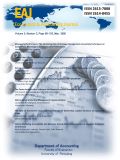Taxpayer Compliance at KPP Pratama Surabaya Mulyorejo with Risk Preference as A Moderated Variables
DOI:
https://doi.org/10.32493/eaj.v4i1.y2021.p48-58Keywords:
Tax Audit, Tax Knowledge, Fiscal Service, Risk Preferences, Taxpayer ComplianceAbstract
This study aims to examine taxpayer compliance that is influenced by tax audits, knowledge of taxation and tax administration services moderated by risk preferences. The object in this study is an individual taxpayer registered at KPP Pratama Surabaya Mulyorejo. The analytical method used in this study is GSCA. The results showed that tax audits, fiscal services have an effect on taxpayer compliance, while tax knowledge does not contribute to taxpayer compliance. Risk preference moderates the relationship between tax audit and taxpayer services on taxpayer compliance, but cannot moderate taxation knowledge on taxpayer compliance.
References
Caroline, Veronica. (2009). Pengetahuan Pajak. Jakarta: Salemba Empat.
Dewi, A. K., Darmansyah., & Djadang, S. (2017). Antecedent terhadap Kepatuhan Wajib Pajak Badan Dengan Tax Amnesty Sebagai Pemoderasi. JIAFE (Jurnal Ilmiah Akuntansi Fakultas Ekonomi) Volume 3 No. 1 Tahun 2017, Hal. 49-61.E-ISSN 2502-4159.
Direktorat Jenderal Pajak. Undang-Undang Nomor 28 Tahun (2007). Undang-undang Nomor 6 tahun 1983 tentang Ketentuan Umum dan tata Cara Perpajakan.
Direktorat Jenderal Pajak. Masalah Kepatuhan Wajib Pajak Di Indonesia Tahun (2015-2019).
Direktorat Jenderal Pajak. Rasio Pajak Di Indonesia Tahun (2015-2019).
Dwi, Paramita, Pranandita.(2018). Pengaruh Pemahaman Peraturan Perpajakan dan Kesadaran Wajib Pajak Terhadap Kepatuhan Wajib Pajak Dengan Preferensi Risiko Sebagai Variabel Moderating. Journal of Accounting 2018. Fakultas Ekonomi Universitas Pandanaran Semarang.
Husein, Umar. (2010). Metode Penelitian Untuk Skripsi dan Tesis Bisnis Edisi 11. Jakarta: PT Raja Grafindo Persada.
Hwang, Heungsun dan Yoshio Takane. (2004). "Generalized Structured Component Analysis." Psychometrika, 69 (1), 81-99.
Kahneman, Daniel dan Amos Tversky. (1979). Prospect Theory: An Analysis of Decision Under Risk. Econometrica, vol. 47, pp.263-291.
Latan, Hengky. (2014). Teori, Konsep dan Aplikasi Menggunakan Program Generalized Structured Component Analysis (GeSCA). Bandung: Sarana Tutorial Nurani Sejahtera.
Nazir. Mohammad,Ph.D.(2011). Metode Penelitian. Jakarta: Ghalia Indonesia.
Nur, Mulyani, (2020). Pengaruh Sikap Rasional, Pelayanan, Dan Pemahaman Peraturan Pajak Terhadap Tingkat Kepatuhan Wajib Pajak Dengan Preferensi Risiko Sebagai Variabel Moderating. Prosiding Seminar Nasional, ISSN (P): 2615 – 2584.
Peraturan Menteri Keuangan Republik Indonesia Nomor 17/PMK.03/2013 Tentang Tata Cara Pemeriksaan.
Putri, Devi, & Amijaya. (2020). Knowlwedge of Taxation and Fiscus Service on Taxpayers Compliance. Dinasti International Journal of Economics, Finance and Accounting. Volume 1, Issue 1, March 2020.
Rendy, R., & Irawati, W. (2019). Understanding Of Tax Rules, Tax Tariffs and Tax-Rights Consciousness on E-Commerce Users Tax Compliance. EAJ (Economics And Accounting Journal), 2(2), 141-148.
Siti Kurnia Rahayu. (2010). Perpajakan Indonesia: Konsep Dan Aspek Formal. Jakarta: Graha Ilmu.
Sitkin, S.B., & Pablo, A.L. (1992). Reconceptualizing the determinants of risk behaviour. Academy of Management Review;17, pp. 9-38.
Sugiyono. (2017). Metode Penelitian Kuantitatif, Kualitatif, dan R&D. Bandung : Alfabeta.
Yanto, Iksan, Hastut. (2020). Pengaruh Tax Amnesty, Pengetahuan Perpajakan dan Pelayanan Fiskus Terhadap Kepatuhan Wajib Pajak. Proceedings of Economic Business and Governance Challenges 2019, October 03, Indonesia, 2020 EAI DOI 10.4108/eai.3-10-2019.2291943.
Yuslina, Tanjung, dan Silfi .(2018).â€Pengaruh Pelayanan Fiskus, Pengetahuan Perpajakan dan Kesadaran Wajib Pajak Terhadap Kepatuhan Wajib Pajak dengan Kondisi Keuangan dan Preferensi Resiko Wajib Pajak Sebagai Variabel Moderating (Study Empiris pada Wajib Pajak Orang Pribadi di Kota Pekanbaru)â€. Jurnal Akuntansi & Manajemen, Vol 13, No. 2 - 2018, 40-57
Published
Issue
Section
License
Copyright (c) 2024 Alif Faruqi Febri Yanto, Soeparlan Pranoto, Dwi Suhartini

This work is licensed under a Creative Commons Attribution-NonCommercial-ShareAlike 4.0 International License.
Authors who publish with this journal agree to the following terms:
- Authors retain copyright and grant the journal right of first publication with the work simultaneously licensed under a Creative Commons Attribution License that allows others to share the work with an acknowledgement of the work's authorship and initial publication in this journal.
- Authors are able to enter into separate, additional contractual arrangements for the non-exclusive distribution of the journal's published version of the work (e.g., post it to an institutional repository or publish it in a book), with an acknowledgement of its initial publication in this journal.
- Authors are permitted and encouraged to post their work online (e.g., in institutional repositories or on their website) prior to and during the submission process, as it can lead to productive exchanges, as well as earlier and greater citation of published work (See The Effect of Open Access).

This work is licensed under a Creative Commons Attribution-ShareAlike 4.0 International License.


